Writers: spending more than 15 minutes staring at that blank document?
Stuck in the vortex of continually being unable to produce awesome content?
Suffering from burnout or brain fog?
Our guide on how to write better is for you.
Inside, learn practical, helpful tips on how to write better from leading pros in the online writing space.
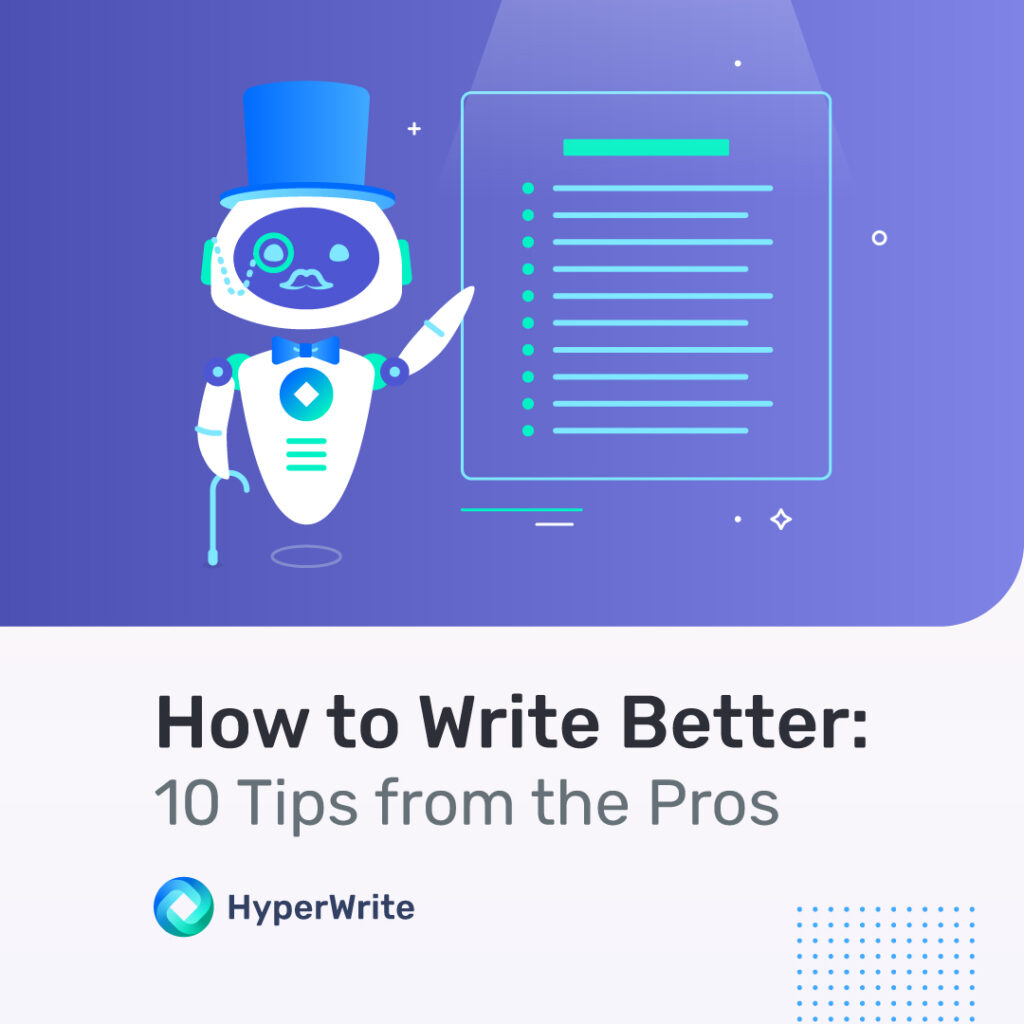
10 Writing Tips from the Pros
You don’t have to figure out how to write better on your own. Sign up for HyperWrite to help you write better instantly.
You can also consult the pros to see what they do to improve their writing.
Here are 10 tips from the pros to help you learn how to write better.
1. Joanna Wiebe, Conversion Copywriter Queen: Focus on Headlines and Subheadings
Your headline is the most important part of your content.
Joanne gives this advice when it comes to crafting viral headlines:
“The most powerful words you can use in headlines come directly from the words your prospects and customers are saying when they talk about the problem your products or services solve.”
If you want to know what to write in your headline or title, use your readers’ own words. Two great places to start are Google Search Results and Reddit topics on your subject.
Don’t stop at your headline. Continue using those questions and results to create subheadings and chapters. These help your readers navigate your content.

Did you know?
Only 59% of readers will read past the headline of any article.
This study first came out in 2016, and the concept was unintentionally tested again in 2019 when a headline with a glaringly empty post got published on Upworthy. It was still shared over 2,000 times. People even commented – on just the headline.
These statistics aren’t meant to discourage you from writing. Instead, focus on how to write better through crafting enticing headlines and titles that will encourage people to read what you’ve written – from blog posts to news articles, ebooks, and landing pages.
2. David Ogilvy, OG of Copywriting: Speak Naturally – Don’t Get Caught Up In Technicalities
One great piece of advice about tone comes from David Ogilvy:
“I don’t know the rules of grammar. If you’re trying to persuade people to do something, or buy something, it seems to me you should use their language.”
You can have a grammatically perfect blog post but never get a single share.
Your ebook can have a fantastic subject-verb agreement, but no one purchases it.
Writing is not only about the technicalities.
People want to relate to what you are saying. You can learn how to write better sentences by writing how you speak – even if that means bending high school grammar rules.
Use common phrases, contractions, and regular vocabulary to make your writing sound more natural.
Reading your writing out loud is the best test for natural flow.
3. Jon Morrow, Blogging Hero: No Need to Reinvent the Wheel – Or Written Word
Jon Morrow, who earned the title of Mr. Blogger, said this about how to write better:
“I found and perfected a dozen different ‘recipes’ for writing popular posts …The result? Starting a blog and writing popular posts are now as straightforward as cooking up a batch of your grandmother’s chocolate chip cookies. You just have to follow the directions.”
This subheading is based on an article by Jon Morrow which was based on an article by Brian Clark.
Writers are constantly borrowing ideas and inspiration from each other – like formats and structure.
You don’t have to write from scratch to become a good writer. The internet is filled with excellent writers who have done most of the work for you. You just need to use the recipes they created, and insert your own ingredients – or words.
Never plagiarize someone else’s work in the process. That will instantly destroy your credibility as a writer.
You are using other people’s ideas, linking to the original authors, then adding a creative twist to those ideas that is uniquely yours.
Do you want to learn how to write a blog post?
Try these popular recipes: list articles, how-to articles, and question articles.
- List articles give a specific number of items to be covered. This article’s list is “10 Tips from the Pros.” The readers know what to expect and easily navigate their way through the content.
- How-to articles explain how to perform a task or learn a new skill. They use numbered steps to describe a process.
- Question articles answer a question. You can use Google and Reddit to find those questions, just like you do for headlines.
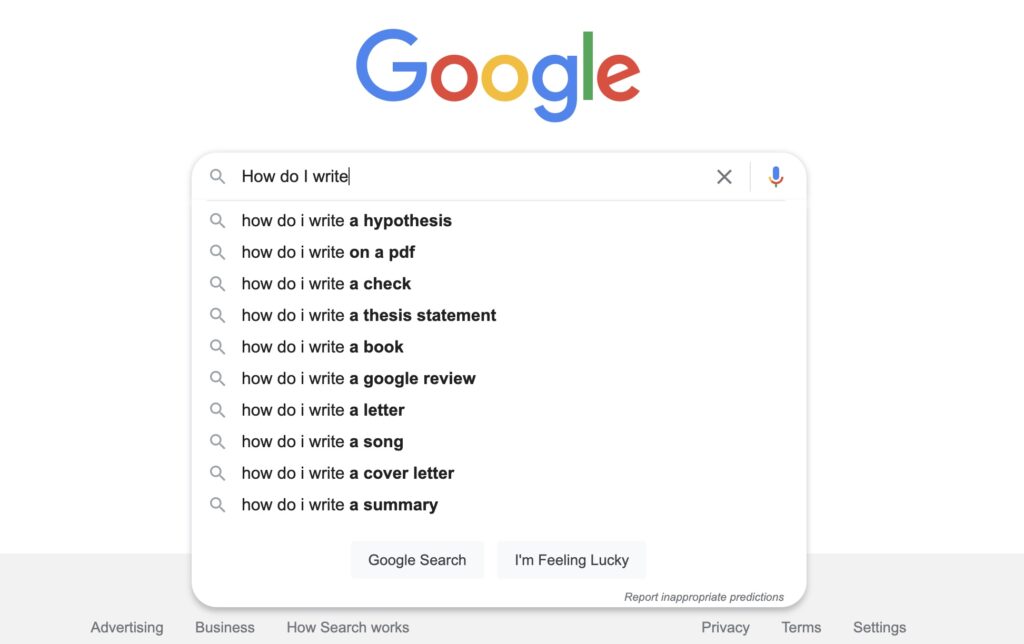
4. Sonia Simone, Writer Extraordinaire: Set and Keep Consistent Deadlines
Sonia Simone gives this quote about writer’s block:
“Most of the best writers I know are semi-blocked most of the time. You avoid it by not being able to avoid it. When you have to work, the work gets done.”
Without deadlines, most content would not get written. The main culprit is writer’s block.
If you do not have a deadline set, create deadlines for yourself to encourage you to keep writing – even when you don’t feel inspired.
The term deadline comes from the newspaper industry but is believed to have originated from Civil War times. Prisons would draw a line – if someone crossed that line, they would be shot.
Writing deadlines aren’t life or death, but they should still be taken seriously.
Here are some common reasons writers miss deadlines:
- Lack of direction
- Taking on too much work
- Procrastination on a project
- Fear of failure
What is keeping you from writing?
Address it head on, then just start writing. The more you write, the more you will learn how to write better.
5. Jeff Goins, Creative Leader and Author: Find a Mentor to Help You Grow
Jeff Goins shared this secret to his success:
“It wasn’t until I started putting myself around teachers and around the teaching of true masters that I realized how little I knew and how much I still had to grow as a writer.”
Even the best writers have mentors.
Find a writing mentor who can critique your writing. A mentor will help you continue to grow – no matter how advanced a writer you are.
You never truly stop learning in life. Over 73% of adults continue learning beyond their degree. These adults are called “lifelong learners.”
Mentors can be found through certification courses, online groups, advanced educational classes, or can simply be a friend you respect.
6. Mark Twain, the Greatest Humorist in the U.S.: Be Passionate About Writing
Mark Twain famously said:
“Find a job you enjoy doing, and you will never have to work a day in your life.”
You can’t expect your audience to care about what you are writing if you don’t care about it first.
Be passionate about what you are writing. Also, be passionate about the process of writing itself.
This passion will fuel you to write quality content.
7. Joanna Penn, Self-Publishing Master: Keep It Concise and Simple
Joanna Penn gave this fact concerning how to improve your writing style:
“Data analysis of bestselling books indicates that shorter sentences characterize bestsellers, but we all know how hard that can be to do in practice. … Grammarly can act like a second pair of eyes, pointing out problems we wouldn’t see otherwise.”
Don’t waste your reader’s time.
Cut out extra words and unnecessary phrases. Everything in your content should be relevant to your topic.
The previous sentence could have said, “Everything in your content should help to bring relevance to your topic and underlying points.”
That was long and unnecessary. The extra words were cut out to get straight to the point.
One tool that fixes your grammar and conciseness is Grammarly. It not only tells you WHAT to fix, but HOW to fix it. Grammarly is your own personal assistant – teaching you how to write better.
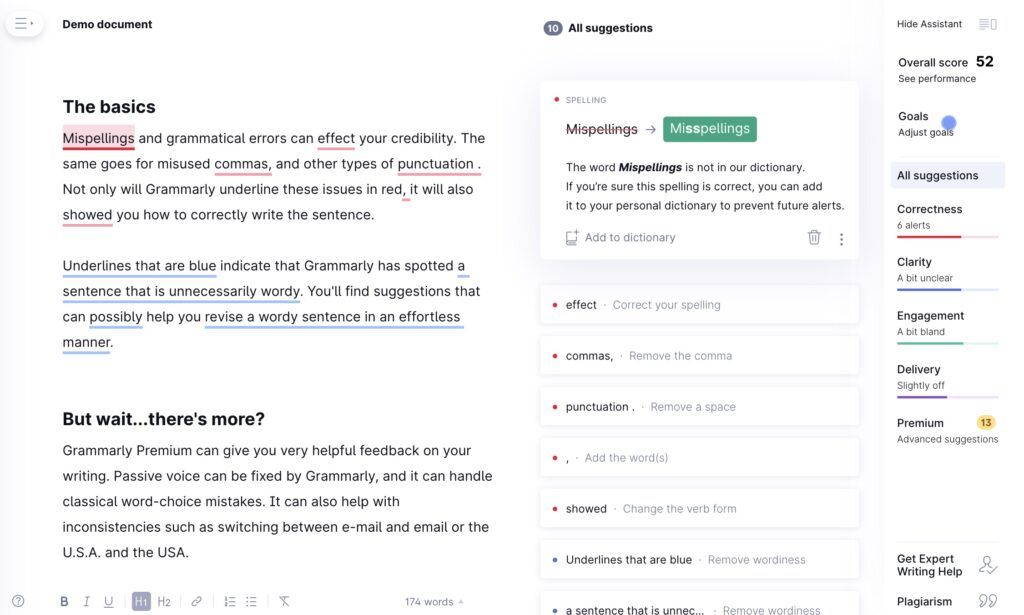
8. Seth Godin, Remarkable Entrepreneur Author: Create Unique and Valuable Content
Author, blogger, and founder of Akimbo, Seth Godin says:
“Being noticed is not the same as being remarkable. Running down the street naked will get you noticed, but it won’t accomplish much.”
There are two mistakes you should avoid as a writer:
- Creating the same content everyone else is creating
- Creating pointless content for temporary attention.
Write something worth reading. Take extra time to dig out new information that your readers haven’t heard before.
Consider this quote by Joe Bunting about his writing process:
“Ask yourself, ‘What is interesting about this? How can I present this subject in a way that’s more interesting?’”
The internet is full of content created for shares and likes. The content is pointless and the reader leaves without learning anything new. That is how you get noticed, not how you succeed as a writer.
Focus on value and the shares will follow.
9. Malcolm Gladwell, Pop Culture’s Journalist: If You Want to Write Better, You Need to Write More
Malcolm Gladwell gave this advice on how he learned to write better:
“Practice isn’t the thing you do once you’re good. It’s the thing you do that makes you good.”
Write blog posts
Write journal entries.
Write emails to your grandma.
Malcolm Gladwell popularized the concept of the “10,000-hour rule” in his book Outliers: The Story of Success. He said you need 10,000 hours of practice to become a master at anything.
If you want to write an article or book, don’t write it WHEN you are better at writing. Write it TO BECOME better at writing.
10. Roz Morris, Emerging Ghost in Contemporary Literature: Read, Read, and Read Some More
Author Roz Morris says:
“Reading – the good and the bad – inspires you. It develops your palate for all the tricks that writers have invented over the years. You can learn from textbooks about the writing craft, but there’s no substitute for discovering for yourself how a writer pulls off a trick. Then that becomes part of your experience.”
Writing only requires a few hours each day. The rest of your time should be spent researching and studying. If you want to know how to be a good writer – start with reading.
According to a report by the New York Times, reading helps improve your knowledge, emotional health, creativity, vocabulary, and empathy. All of these are essential functions when learning how to write better.
You just read several tips by pros about how they became better writers. Follow up by subscribing to their blogs and learning from their writing styles.
AI Simplifies Basic and Complex Human Tasks
When you hear the term “artificial intelligence” what comes to mind?
You might be thinking of an experience from The Terminator where machines take over the world.
Take everything Hollywood taught you about AI, and throw it away. AI is not here to take over human jobs – and eventually the world.
AI needs humans just as much as humans need AI. As a writer, you can also benefit from what AI offers.
What Is Artificial Intelligence?
Professor John McCarthy gives this definition of AI:
“It is the science and engineering of making intelligent machines, especially intelligent computer programs. It is related to the similar task of using computers to understand human intelligence, but AI does not have to confine itself to methods that are biologically observable.”
People and AI need each other if society wants to continue to advance. People are limited in what they can do because of their biology.
People can create airplanes to fly – but will never be able to fly themselves.
People can use calculators to solve complex math – but are limited on the equations they can solve on their own.
AI crosses lines people can’t so society can accomplish more.
How Do Humans and AI Work Together?
According to an article by Harvard Business Review, humans serve three essential roles for AI:
- Train
- Explain
- Sustain
Scientists use code to tell a machine what its job is and how to respond. More advanced AI can observe people and learn directly from human interaction with AI. Writers see this feature when using predictive text.
AI helps people by processing information in a way people’s minds aren’t able to on their own. People are needed to take that information and translate it for society to understand.
Individuals are responsible for keeping AI services running so the rest of the world can enjoy their conveniences.
AI is not stealing anyone’s job, it is changing how people do their jobs by making life easier and safer for those in the workforce.
But What About Writers?
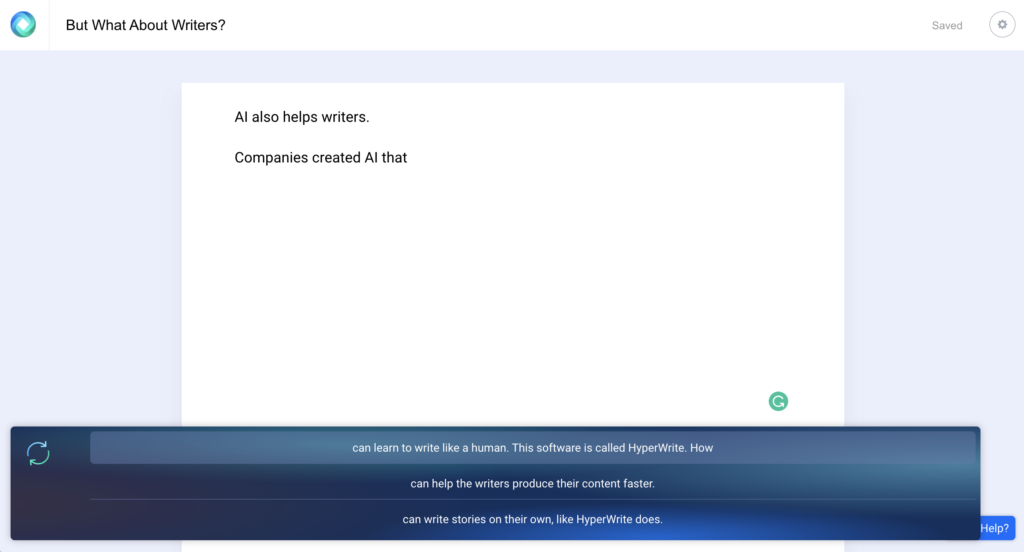
AI also helps writers.
Companies created AI that can learn to write like a human. This takes the guesswork out of writing.
AI learns a writer’s style, thinking, and topic – then gives predictive text and suggested edits that a writer might not have thought of on their own.
AI makes it easier to write faster and come up with original content.
As a writer, you can spend more time researching and thinking of what to write – while AI comes alongside to assist you in how to write faster and how to write better.
Start Writing Better and Faster Today with HyperWrite
One of the best AI tools for writers is HyperWrite. It uses predictive text to give you the next sentence – even when you have writer’s block.
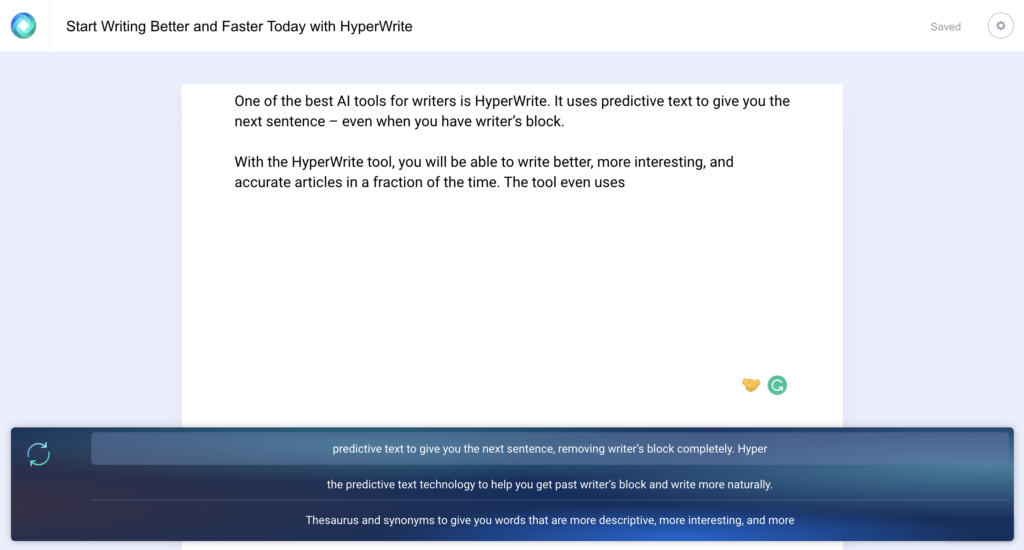
With HyperWrite’s tool, you will be able to write better, more interesting, and accurate articles in a fraction of the time.
The tool even uses synonyms to give you words that are more descriptive and interesting.
In fact, this conclusion was written entirely using the HyperWrite tool.
If you’re a writer and would like to learn more about HyperWrite, learn more about HyperWrite now.
Sign up for free and start writing faster today with HyperWrite.


